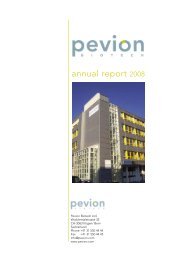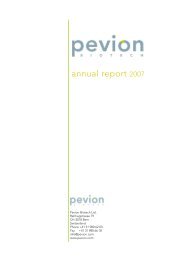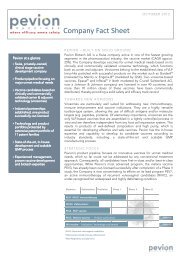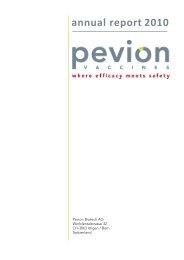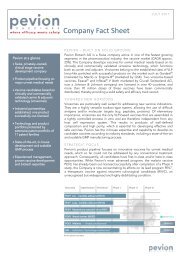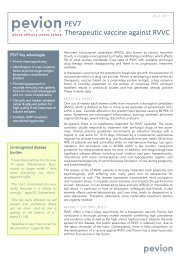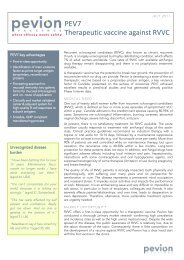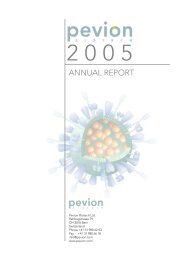Candida Vaccine PEV7 - Pevion Biotech AG
Candida Vaccine PEV7 - Pevion Biotech AG
Candida Vaccine PEV7 - Pevion Biotech AG
Create successful ePaper yourself
Turn your PDF publications into a flip-book with our unique Google optimized e-Paper software.
Key advantages of <strong>Pevion</strong><br />
<strong>Biotech</strong>’s <strong>Candida</strong> vaccine<br />
• Identification of main virulence<br />
factor as prime target antigen<br />
(recombinant protein, exclusive<br />
rights)<br />
• Demonstrated efficacy of carrier<br />
& adjuvant system for highquality<br />
antibody responses to<br />
subunit antigens<br />
• Market-approved safety and<br />
local tolerability of carrier &<br />
adjuvant system<br />
• Established GMP<br />
manufacturing on a commercial<br />
scale<br />
<strong>Candida</strong> <strong>Vaccine</strong> <strong>PEV7</strong><br />
Vulvovaginal <strong>Candida</strong> infection is a significant health problem in developed<br />
countries with no sufficient treatment options and no long-term protection<br />
available. <strong>Pevion</strong> <strong>Biotech</strong> is developing a state-of-the-art subunit vaccine based<br />
on a prime target antigen, a key virulence factor of <strong>Candida</strong> which is<br />
formulated with <strong>Pevion</strong> <strong>Biotech</strong>’s market-approved virosomes. The vaccine<br />
candidate <strong>PEV7</strong> achieved excellent results in preclinical studies and has<br />
entered clinical testing.<br />
M E D I C A L N E E D<br />
Vulvovaginal candidiasis (VVC) is the second most common cause of vaginitis. It<br />
affects 50-75% of healthy women at least once during their reproductive life.<br />
Symptoms are continuous vaginal discharges, itching, soreness and irritation.<br />
Predisposing factors to VVC include pregnancy, diabetes mellitus, use of<br />
broad-spectrum antibiotics and AIDS. Pregnancy, diabetes mellitus and AIDS<br />
are all associated with decrease in host immune defenses, whereas antibiotics<br />
can damage the vaginal flora allowing an overgrowth of <strong>Candida</strong>. However,<br />
VVC can also occur in the absence of these factors.<br />
About 5-8% of the infected women suffer from recurrent VVC, which is difficult<br />
to control and remains never completely cured until menopause. Usually,<br />
patients with recurrent VVC complain of at least four acute attacks per year,<br />
strongly impacting quality of life. <strong>Candida</strong> albicans is the predominant species<br />
causing 70-90% of cases.<br />
Currently, there is no prophylactic treatment available and therapeutic<br />
treatments are associated with significant disadvantages. Long-term protection<br />
does not exist. Therapy of acute infections is based on anti-fungal drugs.<br />
Guidelines recommend an induction therapy with 10-14 days of a topical or<br />
oral azole followed by a suppressive regimen for at least 6 months (usually oral<br />
fluconazole once weekly). However, anti-fungal drugs have many adverse<br />
effects including local irritation and pain, hepatotoxicity, interactions with some<br />
contraceptives and oral hypoglycemic agents, and supposed teratogenicity of<br />
some therapies (limitation of use during pregnancy). The number of azole–<br />
resistant <strong>Candida</strong> infections has significantly increased in the past years,<br />
presumably due to the frequent and partially inappropriate use of both<br />
prescribed and OTC medications. Therefore, alternative, more sustainable<br />
treatment options are urgently needed.<br />
R A T I O N A L E F O R V A C C I N E D E S I G N<br />
M A R C H 2010<br />
At present, there is no vaccine available for prevention of candidiasis. <strong>Pevion</strong><br />
<strong>Biotech</strong> exclusively in-licensed a recombinant protein antigen, which has been<br />
identified as a main virulence factor and represents a prime vaccine target. The<br />
use of a protein antigen requires a suitable carrier and adjuvant system, and<br />
<strong>Pevion</strong> <strong>Biotech</strong>’s virosome technology is the ideal choice for this purpose.<br />
Women suffering from recurrent VVC are the primary target group for the<br />
<strong>Candida</strong> vaccine.<br />
Very little is known about the immunological mechanism functioning at the<br />
vaginal mucosa, and much of what is known comes from animal rather than<br />
human data. <strong>Candida</strong>-specific cell-mediated immunity has for a long time been<br />
considered the major host defense mechanism against mucosal <strong>Candida</strong><br />
infections. However, recent studies have demonstrated the important role of
2<br />
humoral immunity in protection against mucosal candidiasis. According to<br />
clinical observations, anti-<strong>Candida</strong> IgA and IgG antibodies bind to <strong>Candida</strong><br />
species, thereby reducing their ability to adhere to epithelial cells and thus<br />
preventing the tissue penetration phase. Based on this concept, the goal of<br />
<strong>Pevion</strong> <strong>Biotech</strong>’s <strong>Candida</strong> vaccine is to elicit a strong protective antibody<br />
response that prevents recurrence.<br />
V A C C I N E P R O F I L E<br />
<strong>Pevion</strong> <strong>Biotech</strong> is developing a state-of-the-art vaccine <strong>PEV7</strong> against recurrent<br />
vulvovaginal candidiasis (VVC) caused by the pathogenic form of <strong>Candida</strong><br />
albicans especially in pre-menopausal women of childbearing age with a<br />
history of recurrent VVC. In a later stage of development, application of the<br />
vaccine may be extended to oropharyngeal candidiasis. The vaccine candidate<br />
uses a recombinant protein antigen, one of the main <strong>Candida</strong> albicans<br />
virulence factors, formulated with <strong>Pevion</strong> <strong>Biotech</strong>’s virosomes. In addition to<br />
the standard intramuscular application form, <strong>Pevion</strong> <strong>Biotech</strong> has developed a<br />
formulation for intravaginal mucosal application in order to evaluate a potential<br />
superiority of a locally induced immune response. Presentation of the vaccine<br />
in capsule form would also be more convenient for the patient.<br />
E X C E L L E N T P R E C L I N I C A L R E S U L T S<br />
<strong>Pevion</strong> <strong>Biotech</strong> has clearly demonstrated in preclinical studies that intravaginal<br />
administration of its vaccine candidate <strong>PEV7</strong> generates a good and longlasting<br />
immune response to the native antigen target in the vagina and at the<br />
same time confers protection against <strong>Candida</strong> infections. Both antibody<br />
isotypes, IgA and IgG, which are essential for mucosal immunity, were present<br />
in vaginal fluid of immunized animals. Furthermore, it has been proven that the<br />
virosome-based component enhances both immunogenicity and the protective<br />
effect of the antigen. Moreover, the vaginal mucosal application route<br />
represents a novelty for virosome-based vaccines and may pave the way for<br />
further developments.<br />
x10 3<br />
Figure: Challenge study in rats. Rats were immunized with the <strong>Candida</strong> vaccine <strong>PEV7</strong><br />
and then challenged with pathogenic <strong>Candida</strong> albicans. In immunized rats the<br />
pathogen was rapidly cleared from vaginal fluid (>40% reduction of CFU after 1 day<br />
versus 5% in unvaccinated animals (neg control); complete clearance after 13 days<br />
versus 55% reduction in unvaccinated animals).
3<br />
In summary, key findings from rat and mouse challenge models are as follows:<br />
• Immunization with the vaccine candidate elicited robust antibody levels in<br />
vaginal fluid, both IgA and IgG, specific for the native target protein<br />
• Immunization conferred protection against pathogenic <strong>Candida</strong> albicans<br />
challenge as shown by rapid pathogen clearance from the vagina (see<br />
figure)<br />
• Intranasal, sublingual, and vaginal routes of administration resulted in<br />
comparable protection<br />
Toxicity studies in rats, rabbits, and minipigs showed no abnormalities and<br />
merely very mild local irritation<br />
D E V E L O P M E N T S T A T U S<br />
Recently, the vaccine candidate has entered a clinical Phase I study, which is<br />
designed to evaluate the safety and tolerability of the vaccine, administered by<br />
two different routes (intramuscular and intravaginal) as primary endpoint.<br />
Immunogenicity will be evaluated as secondary endpoint. Enrollment began in<br />
February 2010.<br />
I P S I T U A T I O N<br />
<strong>Pevion</strong> <strong>Biotech</strong> has a complete patent portfolio regarding virosomes covering<br />
all aspects and applications of the virosome technology platform. In addition,<br />
<strong>Pevion</strong> <strong>Biotech</strong> holds exclusive license rights to a prime target <strong>Candida</strong> antigen<br />
and its use in vaccine formulations. <strong>Pevion</strong> <strong>Biotech</strong> has full freedom to operate<br />
for its <strong>Candida</strong> vaccine.<br />
S E L E C T E D R E F E R E N C E S<br />
Anticandidal immunity and vaginitis: novel opportunities for immune<br />
intervention.Cassone A, De Bernardis F, Santoni G.Infect Immun. 2007<br />
Oct;75(10):4675-86. Epub 2007 Jun 11. Review<br />
Vulvovaginal candidosis. Sobel JD. Lancet. 2007 Jun 9;369(9577):1961-71.<br />
Recurrent <strong>Candida</strong> infection. Hurley, R. 1981.. Clin. Obstet. Gynaecol. 8:209-<br />
214.<br />
Evidence that members of the secretory aspartyl proteinase gene family, in<br />
particular SAP2, are virulence factors for <strong>Candida</strong> vaginitis. De Bernardis, F., S.<br />
Arancia, L. Morelli, B. Hube, D. Sanglard, W. Schafer, and A. Cassone. 1999.. J<br />
Infect. Dis. 179:201-208.
4<br />
To request further information, please contact.<br />
Dr. Julian Wagner, Business Development Manager<br />
julian.wagner@pevion.com, Tel: +41 31 550 44 13<br />
<strong>Pevion</strong> <strong>Biotech</strong> Ltd.<br />
Worblentalstrasse 32<br />
3063 Ittigen<br />
Switzerland<br />
Phone +41 31 550 44 44<br />
Fax +41 31 550 44 45<br />
info@pevion.com<br />
www.pevion.com



